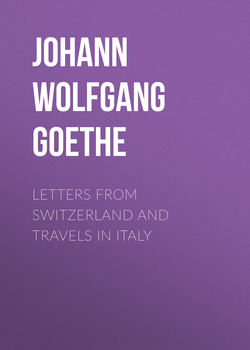Читать книгу Letters from Switzerland and Travels in Italy - Johann Wolfgang von Goethe - Страница 14
LETTERS FROM SWITZERLAND
PART THE SECOND
Geneva
ОглавлениеAt different spots of our travels so much was said of the remarkable character of the glaciers of Savoy, and when we reached Geneva we were told it was becoming more and more the fashion to visit them, that the Count1 was seized with a strange desire to bend our course in that direction, and from Geneva to cross Cluse and Salenche, and enter the valley of Chamouni, and after contemplating its wonderful objects, to go on by Valorsine and Trent into Valais. This route, however, which was the one usually pursued by travellers, was thought dangerous in this season of the year. A visit was therefore paid to M. de Saussure at his country-house, and his advice requested. He assured us that we need not hesitate to take that route; there was no snow as yet on the middle-sized mountains, and if on our road we were attentive to the signs of the weather and the advice of the country-people, who were seldom wrong in their judgment, we might enter upon this journey with perfect safety. Here is the copy of the journal of a day's hard travelling.
Cluse, in Savoy, Nov. 3, 1779.
To-day on departing from Geneva our party divided. The Count with me and a huntsman took the route to Savoy. Friend W. with the horses proceeded through the Pays de Vaud for Valais. In a light four-wheeled cabriolet we proceeded first of all to visit Hüber at his country-seat, – a man out of whom, mind, imagination and imitative tact, oozes at every pore, – one of the very few thorough men we have met with. He saw us well on our way, and then we set off with the lofty snow-capped mountains, which we wished to reach, before our eyes. From the Lake of Geneva the mountain-chains verge towards each other to the point where Bonneville lies, half way between the Mole, a considerable mountain, and the Arve. There we took our dinner. Behind the town the valley closes right in. Although not very broad, it has the Arve flowing gently through it, and is on the southern side well cultivated, and everywhere the soil is put to some profit. From the early morning we had been in fear of its raining some time at least before night, but the clouds gradually quitted the mountains, and dispersed into fleeces, – a sign which has more than once in our experience proved a favourable omen. The air was as warm as it usually is in the beginning of September, and the country we travelled through beautiful. Many of the trees being still green; most of them had assumed a brownish-yellow tint, but only a few were quite bare. The crops were rich and verdant; the mountains caught from the red sunset a rosy hue, blended with violet; and all these rich tints were combined with grand, beautiful, and agreeable forms of the landscape. We talked over much that was good. Towards 5 we came towards Cluse, where the valley closes, and has only one outlet, through which the Arve issues from the mountains, and by which also we propose to enter them to-morrow. We ascended a lofty eminence, and saw beneath us the city, partly built on the slightly inclined side of a rock, but partly on the flat portion of the valley. Our eyes ranged with pleasure over the valley, and sitting on the granite rocks we awaited the coming of night in calm and varied discourse. Towards seven, as we descended, it was not at all colder than it is usually in summer about nine. At a miserable inn (where, however, the people were ready and willing, and by their patois afforded us much amusement) we are now going, about ten o'clock, to bed, intending to set out early to-morrow, before the morning shall dawn.
Salenche, Nov. 4, 1779. Noon.
1
The Duke Charles Augustus of Weimar, who travelled under the title of Count of…
